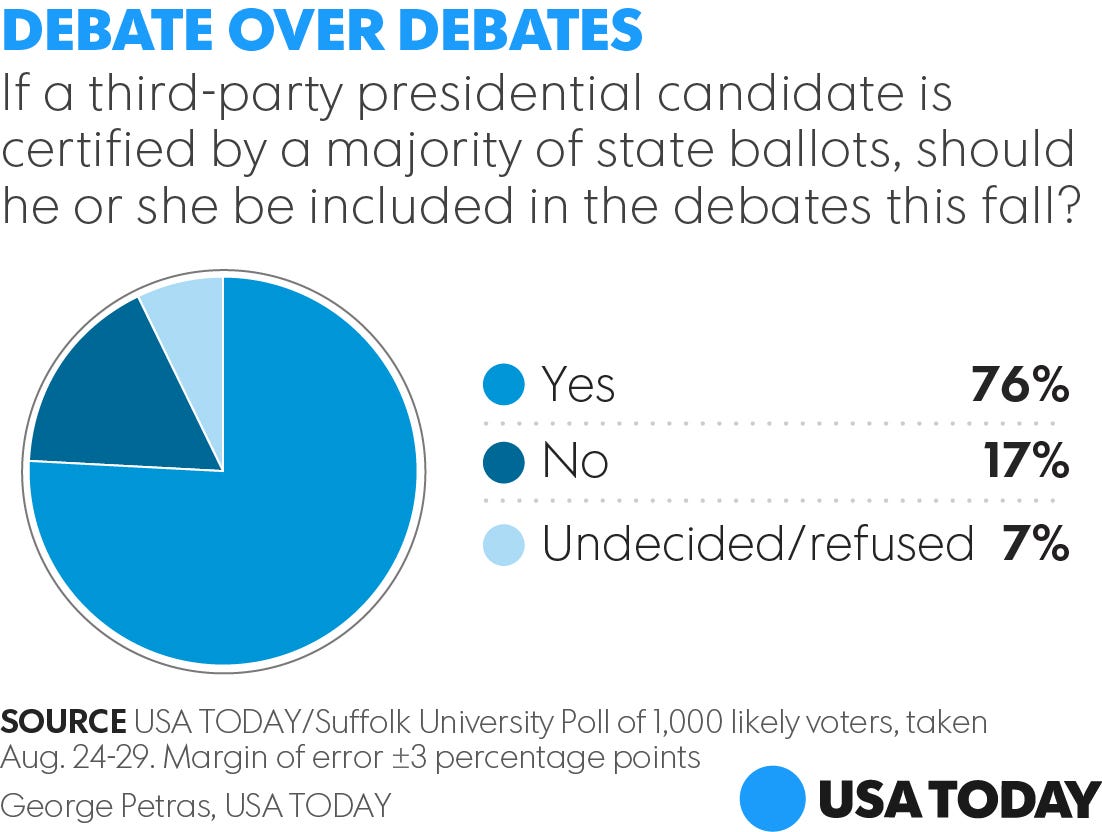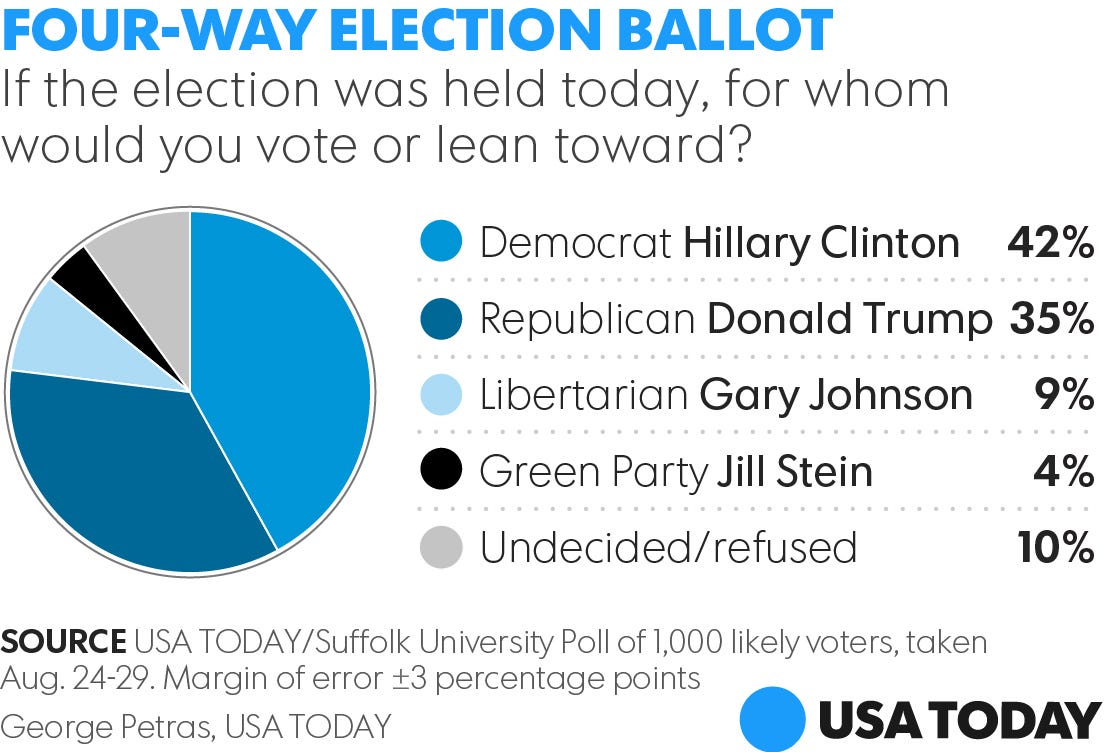Poll: Fear, not excitement, driving Clinton and Trump supporters
Not even their own supporters are all that excited about winning.

A nationwide USA TODAY/Suffolk University Poll, taken as Labor Day launches the final sprint toward the election, finds supporters of both Democrat Hillary Clinton and Republican Donald Trump more motivated by fear about the other side claiming the White House than they are by excitement about their own candidate prevailing.
Clinton holds a 7-percentage-point lead over Trump, 48%-41%, close to the 6-point lead she held two months ago in the survey. But the proportion of undecided voters is chipping away, now below 10%. And in a four-way ballot, support for third-party contenders has ticked up, to 9% for Libertarian Gary Johnson and 4% for Jill Stein of the Green Party.
Good news for the GOP: Most Clinton voters say they'll split their ticket
Prep for the polls: See who is running for president and compare where they stand on key issues in our Voter Guide
Driving the election is antipathy toward the competition: 80% of Trump supporters and 62% of Clinton supporters say if the other candidate wins in November, they would feel "scared," the most negative of four possible choices.
Those are stronger feelings than they express about a victory by their own candidate. Just 27% of Clinton supporters and 29% of Trump supporters would feel "excited," the most positive choice. A majority of both sides — 62% for Clinton and 52% for Trump — predict a more temperate "satisfied" feeling instead.
"I honestly think she'll be a good president, as flawed as she is," says Carol Fisher, 56, a Clinton supporter and registered nurse from Teaneck, N.J., who was among those surveyed. "And I believe the alternative of a Trump presidency would be disastrous, not just for our country but for the whole world." While she usually votes for Democratic candidates, she says, "I've never been so afraid of a Republican before."
Noel Hartman, 64, of Humboldt, Ariz., feels the same way about Clinton.
"The one word that really stands out is 'above the law,' " the retired farmer and rancher said in a follow-up phone interview. "I mean, anything that she ever did has never been accounted for, and she gets by with just laughing it off." He's supporting Trump. "I know he doesn't say stuff right, but I'm so tired of being lied to," Hartman says. "I'm hoping for change."
The poll of 1,000 likely voters, taken Aug. 24-29, has a margin of error of +/- 3 percentage points.
#TrumpNation: Supporters see themselves in Republican nominee
#ClintonNation: This is why Americans are voting for Hillary Clinton
Unprecedented negative ratings for both candidates and fierce polarization between the two parties underscore the challenges ahead for whomever wins in November. The new president will face a significant swath of voters who view his or her election as catastrophic for the country — not exactly a prescription for a political honeymoon.
It's a sentiment both sides are fueling. Clinton's TV ads darkly question whether Trump could be trusted to command the nation's nuclear weapons. Trump has dubbed his opponent "Crooked Hillary," and his rallies rebound with chants of "Lock her up!"
Team Clinton raised a staggering $143 million in August
Nearly three in 10 of Clinton supporters say they are mostly voting against Trump, not for her. Nearly four in 10 of Trump supporters say they are voting mostly against Clinton, not for him.
Are they honest?

Most Americans already doubt the integrity of both candidates. Fifty-nine percent say they don't think Clinton is honest and trustworthy, including nearly one-fourth of her own supporters. Sixty-one percent of those surveyed say they don't think Trump is honest and trustworthy, including one-fifth of his supporters.
Two continuing controversies may be contributing to those negative impressions:
• Nearly eight in 10 say Trump should release his tax returns, as every major-party presidential nominee has done since 1976. Two-thirds of those who back Trump say he should release them, at least for the years that are no longer being audited. Trump says he won't release any returns until an ongoing IRS audit is concluded.
• A 54% majority of those surveyed say Clinton and her husband, former president Bill Clinton, didn't take appropriate steps to avoid conflicts of interest in donations to the Clinton Foundation. Just 30% say she shouldn't be criticized for the donations to the foundation. Newly released emails show foundation officials seeking meetings for big donors with Hillary Clinton when she was secretary of State. Nearly three in 10 of those who back Clinton say she didn't take appropriate steps to avoid the controversy.
"Whatever happened to morals and standards?" fumes Joe Thomas, 64, a Trump supporter from Trinity, N.C. "She's not honest and trustworthy." Is Trump? "Well, more than her," he replies, adding that he believes the billionaire businessman would make "a great president."
Hillary Clinton defends Clinton Foundation, State Department
Clinton releases 2015 tax return, prods Trump to do the same
Lori Sorenson, 34, a Clinton supporter and software trainer from Alexandria, Va., says the flap over the foundation doesn't bother her "that much," saying Clinton is being faulted for practices that many politicians follow. "I've never been a big fan of her," Sorenson says. "But I'm definitely a bigger fan of her than him."
Meanwhile, Americans are divided on whether Trump is a racist, a charge made by critics who cite his provocative rhetoric against Mexicans, Muslims and immigrants: 44% of those surveyed say they see him as a racist; 47% say he's not. Among African-Americans, more than eight in 10 say he's a racist, and among Hispanics, more than six in 10 agree. But a 54% majority of whites say he's not.
By wide margins, supporters of both candidates say third-party contenders who are certified on a majority of state ballots should be included in the fall debates. The nonpartisan Commission on Presidential Debates, which sponsors them, sets a threshold of 15% support in national polls, a benchmark neither Johnson nor Stein now meet. But 76% of those surveyed say they should be allowed to participate; 17% say they shouldn't.
The first debate is scheduled for Sept. 26 at Hofstra University on Long Island in New York.
Paleologos on the poll: Voters want third-party candidates on debate stage

Time and opportunity
There's time and opportunity for the landscape to change, of course. Still ahead are millions of dollars worth of TV ads and four debates, three between the presidential candidates and one between the vice presidential candidates, assuming they go ahead as planned. Unexpected developments, here or abroad, could seize the headlines.
But a summer of intense media coverage and roiling controversies on issues from Clinton's emails to Trump's shifting stance on immigration has done little to move the electorate. Clinton's unfavorable rating has inched down a point and a half since June; her favorable rating hasn't changed. Trump's ratings have barely budged. Their negative ratings, 51% for Clinton and 59% for Trump, still set unwelcome records for presidential candidates in the modern era.
Poll: Clinton, Trump most unfavorable candidates ever
There's a gender gap that also rivals the record. Clinton now leads among women by 54%-38% while the two contenders split men, 44% for Trump and 43% for Clinton. The 11-point difference in Clinton's support between male and female voters precisely mirrors the record gender gap that Bill Clinton scored over Bob Dole two decades ago.
There is also a racial divide, despite recent speeches in which Trump has sought the votes of African Americans. In the survey, more than nine of 10 black voters and two-thirds of Hispanic voters support Clinton. Trump is supported by a minuscule 4% of blacks and about one in four Hispanics. He leads Clinton among whites, 49% to 41%.
The sharpest division of all may be the assessments Clinton and Trump supporters make of the nation itself. In some ways, they seem to be living on different planets.
Nearly all of Trump supporters — nine of 10 — say the United States has gotten off on the wrong track. They give a negative assessment of the economy as being stagnated or in recession or even depression. More than nine of 10 have an unfavorable view of President Obama.
A majority of Clinton supporters see a country that's headed in the right direction and an economy that is in recovery. More than nine of 10 have a favorable impression of Obama.
"I'm cognizant of the fact we are doing well here and perhaps not all parts of the country are doing as well as we are doing, but I'm seeing a roaring comeback" from the recession in Massachusetts, says Pamela Armstrong, 57, of Lexington, the communications manager for a nonprofit health insurer who supports Clinton. "On balance, I would say America's strong; it's focused. We have a lot of challenges around the world, but compared with what's going on around the world, we're still in very, very good condition."
Hartman, the retired rancher from Arizona who supports Trump, sees stagnation. "It just isn't as strong as everybody says," he says, saying the younger members of his extended family are "hurting" in a fragile economy. "I don't think we're in a recession, but we're definitely not in a recovery."
'A cold day in hell'

Clinton supporters are convinced, 94% to 1%, that she will win in November. Trump supporters are less confident, predicting by 53%-25% that he will win. But on one issue the two sides agree. Given three options about how they feel about the presidential election, only a handful pick "bored" and just one of four say they are "excited."
By far the most common choice? "Alarmed."
(That said, the 52% who express alarm is a drop from the 61% who chose that reaction in the poll taken two months ago. The percentage who say they are bored has risen since then to 14% from 9%.)
"He may not have experience but we need somebody from the outside," Joe Thomas says of Trump, calling Clinton "a murderer" for the violent deaths of four Americans in Benghazi, Libya, in 2012, when she led the State Department.
Pamela Armstrong counts herself as enthusiastic about voting for Clinton, but she puts her brother in the "alarmed" category. A die-hard Republican, he was so dismayed by the prospect of Trump as the GOP standard-bearer that he changed his partisan affiliation so he could vote for Clinton in the Bay State primary.
"He scanned his party registration and sent it to me," she says. "He said, 'Look: it's a cold day in hell.' "
